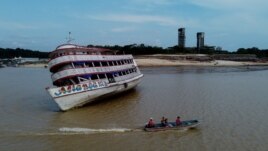19 October 2023
People, animals and fish who depend on the waterways connected to the Amazon River close to the Brazilian city of Manaus are facing a long period of dry weather.
The city's port is an important economic area for northern Brazil. But recently, the water level of the area where the Amazon and Rio Negro rivers meet reached a very low level.
The civil defense agency in Amazonas state said the drought is hurting over 400,000 people.

View of a stranded ferry boat at the Marina do Davi, a docking area of the Negro river, city of Manaus, Amazonas State, northern Brazil, on October 16, 2023. (Photo by MICHAEL DANTAS / AFP)
Those who have floating homes or use boats to move around on the river for work cannot travel. They cannot get fuel, food or fresh water.
Animals and fish along the river are dying. Thousands of dead fish float on the water's surface. A number of river dolphins died when they washed up on land. Dolphins are rare water mammals that live in Brazil's biggest rivers.
The organization that runs the port said the water level is only about 14 meters, the lowest since measurements started in 1902.
The previous all-time low came in 2010.
Without water, ‘there is no life'
Brazil's monitoring and disaster alert center, Cemaden, said the rainfall in the Amazon area is the lowest it has been since July to September 1980.
The nation's science ministry said the weather pattern known as El Niño is to blame for the drought and low rainfall.
Reporters in the area are describing the situation as "grim."
Raimundo Silva do Carmo is a fisherman. But he cannot fish at this time. It takes him much of the day just to get water. One recent morning he was making his fourth visit of the day to a well east of Manaus.
He called carrying a water container back and forth "dreadful work" made harder because of the hot sun. "Without water," he said, "there is no life."
Another man, Joaquim Mendes da Silva is 73. For 43 years, he repaired ships on a large lake. The water is the lowest he has ever seen.
Children in the area stopped going to school one month ago because they could no longer travel by boat to the schoolhouse.
Along with Amazonas state, Cemaden said seven other states recorded their lowest rainfall in 40 years for the period from July to September.
The drought is hurting all of the waterways that connect to the Amazon River, an area that contains 20 percent of the world's fresh water. By last week, 42 of the 62 cities and towns in the area declared a state of emergency.
In one area, about 600 kilometers east of the lake, about 300 families are having trouble getting food and supplies in the Auati-Paraná reserve. They can only use small boats to get to the closest city. As a result, their travel time is 14 hours instead of the usual nine.
Along the river, people fish for a large fish called a pirarucu. The fish weigh as much as 200 kilograms. People catch the fish and then take them to local markets. They usually bring their catch to market by boat. But they can no longer sell the fish because they cannot reach the market.
Edvaldo de Lira is a local business leader. He said the fishermen "run the risk of catching fish in the lake, and it arrives spoiled. So, there is no way for us to fish," de Lira said.
Rain does not fall all year in the Amazon area. Rainfall is light from May to October, but the El Niño weather event is reducing the rain more than usual, said Ana Paula Cunha of Cemaden.
Climate scientists say the effects of El Niño this year are stronger because of global warming. Warming temperatures, they say, are because of carbon gases from years of burning coal, oil and gas.
One of the important rivers in the Amazon area is the Madeira. It travels over 3,500 kilometers from Bolivia to Brazil. Four of its five lowest water levels were recorded in the last four years, the Brazilian Geological Survey said.
In the port city of Porto Velho, the river's level is the lowest since measurements started in 1967. Brazil's fourth-largest hydroelectric dam, which produces power from water, is in nearby Santo Antonio. It stopped producing power last week for the first time since it opened in 2012.
Unprecedented difficulties
For now, the Brazilian government of President Luiz Inácio Lula da Silva is sending food and water to the far away communities in the northern part of the country. Engineers will start digging paths along dry rivers for boat travel. Payments will soon go to families who cannot work.
But the problems will continue, experts say.
Photographs of dead dolphins appeared in newspapers and on television programs. Ayan Fleischmann is a hydrologist, or a scientist who studies water, at the Mamiraua Sustainable Development Institute. It describes itself as a social organization supervised by the Ministry of Science, Technology and Innovation. He said the photos were a "shock for everyone." He said the extreme heat may have hurt the organs of the dolphins or contributed to the growth of harmful bacteria.
"It was an unprecedented tragedy," he said. Unprecedented means never seen before.
Experts in Brazil from the National Institute for Space Research say the drought will likely continue until the end of 2023.
I'm Dan Friedell. And I'm Anna Matteo.
Dan Friedell adapted this report for VOA Learning English based on reporting from the Associated Press and Reuters.
_______________________________________________
Words in This Story
previous –adj. taking place at an earlier time
monitor –v. to watch or observe over time for a special purpose
drought –n. a period with very little rain or with an abnormally low amount of rainfall
grim –adj. causing feelings of sadness or worry
spoiled –adj. ruined; no longer usable or edible